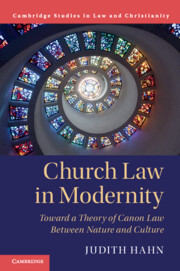Book contents
- Church Law in Modernity
- Law and Christianity
- Church Law in Modernity
- Copyright page
- Contents
- Preface and Acknowledgements
- Introduction
- 1 Nature As a Source of Validity for Religious Law
- 2 Questions from a Canonist’s Point of View
- 3 Canon Law between Nature and Culture
- 4 Consequences for Developing the Law
- 5 Conclusion
- Bibliography
- Index
2 - Questions from a Canonist’s Point of View
Published online by Cambridge University Press: 15 March 2019
- Church Law in Modernity
- Law and Christianity
- Church Law in Modernity
- Copyright page
- Contents
- Preface and Acknowledgements
- Introduction
- 1 Nature As a Source of Validity for Religious Law
- 2 Questions from a Canonist’s Point of View
- 3 Canon Law between Nature and Culture
- 4 Consequences for Developing the Law
- 5 Conclusion
- Bibliography
- Index
Summary
- Type
- Chapter
- Information
- Church Law in ModernityToward a Theory of Canon Law between Nature and Culture, pp. 59 - 115Publisher: Cambridge University PressPrint publication year: 2019



